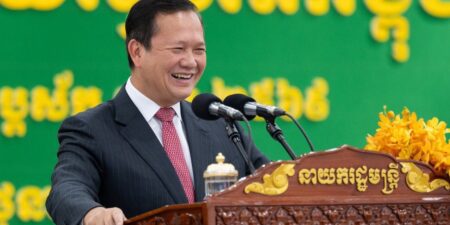Australian Treasurer Jim Chalmers (left) and Chairman of the China Securities Regulatory Commission Wu Quing (right)
Source: X @JEChalmers
The BGA Australia Team, led by Managing Director Michael McNeill, wrote an update to clients on Australian Treasurer Jim Chalmers visit to Beijing.
Context
- Australian Treasurer Jim Chalmers met key counterparts in Beijing from September 26-27 in the first visit by an Australian treasurer to China in seven years. During the meeting, the National Development and Reform Commission and Chinese Securities Commission chairmen provided Chalmers with insight on China’s economic outlook.
- Chalmers repeated the Albanese government’s mantra that the government will “cooperate where we can, disagree where we must and engage in Australia’s national interest” with Australia’s largest trading partner. The resumption of ministerial-level dialogue has been part of the Albanese government’s mission to “stabilize” the relationship. Some China “hawks” believe this has curtailed the government’s ability to call out China’s belligerent actions. Chalmers’ visit follows a series of ministerial-level meetings, including the annual leaders’ meeting in June 2024.
Significance
- The main purpose of the treasurer’s visit was to co-chair the 2024 Australia-China Strategic Economic Dialogue with Zheng Shanjie, chairman of the National Development and Reform Commission. The chairman and treasurer signed a memorandum of understanding for ongoing cooperation at all levels, including sharing knowledge and experience on economic policies. The memorandum facilitates mutual exchanges on the global and regional macroeconomic environment, economic challenges and policy settings in Australia and China, fiscal policies and other topics that are of mutual interest.
- Treasurer Chalmers welcomed Chinese efforts to simulate the economy. Chalmers said a one percentage point drop in China’s GDP growth roughly costs Australia a quarter of a percentage point of its growth and that softer demand for iron ore and metallurgical coal was a threat to the budget bottom line.
Implications
- Businesses should watch for Chinese investment in Australia’s critical minerals sector, an issue that looms as a test of the Australia-China relationship. The government is moving to strengthen oversight of higher-risk foreign investment proposals in areas such as critical minerals, particularly related to clean energy and defense supply chains.
- In the week preceding the visit, Chalmers met with major China-facing Australian companies. These included Rio Tinto, Wesfarmers, BHP, Woodside, Fortescue, Macquarie, BlueScope, HSBC, King & Wood Mallesons, the Port of Newcastle, Sydney Airport, Cochlear, the University of New South Wales and GrainCorp as well as the Business Council of Australia.
We will continue to keep you updated on developments in Australia as they occur. If you have any comments or questions, please contact BGA Australia Managing Director Michael McNeill at mmcneill@bowergroupasia.com.
Best regards,
BGA Australia Team

Managing Director
Mick is a highly-experienced government relations expert and trusted advisor on consensus building, conflict resolution and legislative developments. He has played an integral role in helping parties achieve desired outcomes in areas of national security, health policy, foreign policy and reputational crisis management, as well as media relations, communications campaigns, immigration and human rights. Mick has two decades’ experience working with government as a media analyst, political adviser and NGO advocacy manager. After a stint serving as an adviser to an Australian senator, Mick took on the role of the locally engaged senior political specialist at the U.S. Embassy in ...
Read More


























